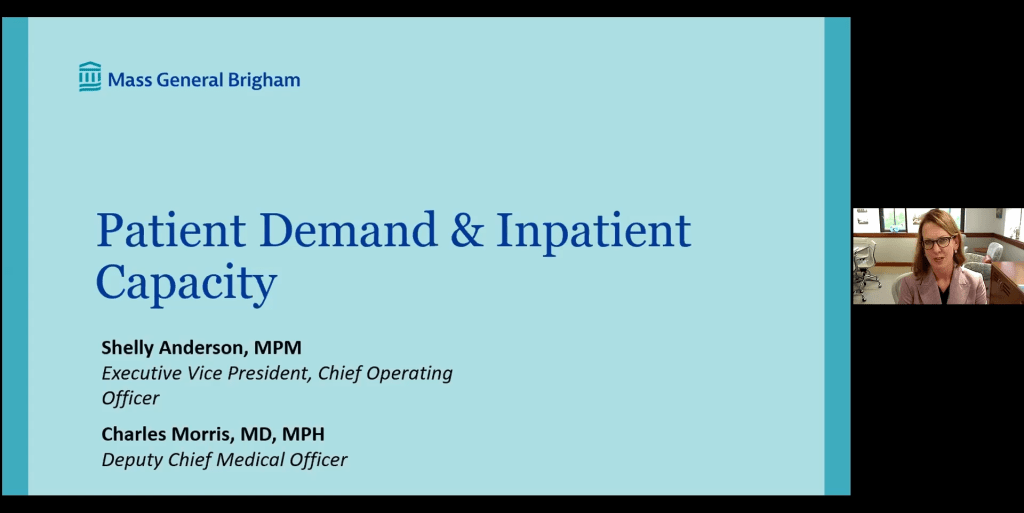Virtual All Staff Forum Spotlights COVID-19 Vaccines, Capacity Management and More

Shelly Anderson takes a moment during the virtual all staff forum to thank staff for their contributions, teamwork and dedication as the Brigham manages an unprecedented demand for acute care.
As the Delta variant continues to fuel a new wave of COVID-19 cases in the region and the Brigham experiences an exceptionally high demand for patient care, getting vaccinated and complying with Mass General Brigham’s mandatory vaccination policy have become more urgent than ever, hospital leaders emphasized during a virtual all staff forum on Sept. 23.
The mandatory vaccination policy requires all Brigham staff working on site and remotely, as well as POIs and contractors working on site, to complete two steps by Friday, Oct. 15: Receive the COVID-19 vaccine and document their vaccine status at vaccinecheck.massgeneralbrigham.org, unless approved for a medical or religious exemption. Effective Sept. 29, compliance includes receiving at least one dose of the Pfizer or Moderna series, on the condition that employees schedule their second vaccine at the recommended interval, complete the vaccination series by Nov. 12 and document their vaccination status for each dose.
Employees who fail to meet these requirements by the deadline will be placed on unpaid administrative leave and lose Epic and computer access, and those who remain noncompliant will face termination of employment. As of Sept. 30, 93 percent of Brigham employees had received the full vaccine course and documented their vaccination status.
Recent changes in COVID Pass now show staff their compliance status upon completing attestation, and managers have a new paper form that staff can use to support offline employees in the consent process.
Sunil Eappen, MD, interim president and chief medical officer, took a moment at the beginning of the forum to speak directly to unvaccinated staff and express his concern for their safety and well-being.
“I’m concerned and worried about the folks who haven’t been vaccinated yet,” Eappen said. “That’s not only because I care about you and want you to get the vaccine, but I also don’t want to lose you as an employee. We do such incredible, important, great work here. I hope that you get your questions answered and move forward to get the vaccine by Oct. 15.”
Michael Klompas, MD, MPH, hospital epidemiologist, underscored the protections that vaccines offer, even in the face of the highly transmissible Delta variant. Across Mass General Brigham, 67 percent of hospitalized patients with COVID-19 are unvaccinated, he noted. At the time of the forum, there were 94 inpatients with COVID-19 across the system.
Paula Squires, MBA, SHRM, SCP, SPHR, senior vice president of Human Resources, thanked staff for their dedication to maintaining a safe environment. “Thank you all for your outstanding service — not only supporting each other during this really challenging time but also your commitment to keeping each other, our patients and visitors safe,” she said. “That commitment really is the focus of our COVID-19 vaccination policy.”
Meeting ‘Unprecedented Demand’ for Care
Shelly Anderson, MPM, executive vice president and chief operating officer, and Charles Morris, MD, MPH, deputy chief medical officer, provided an update on how the Brigham is meeting exceptionally high demand for patient care and managing inpatient capacity.
Anderson noted that hospitals throughout Eastern Massachusetts, including the Brigham and other Mass General Brigham institutions, are experiencing similar pressures and acknowledged the burdens placed on both health care systems and staff.
“We have an increase in patient demand for acute care services that we’ve never seen before. It’s less about COVID, but that’s still a major part of it,” Anderson said. “I know there’s a deep appreciation for all of our care teams and everyone who’s working to support them and our patients.”
Compounding this challenge is the fact that patients are sicker — requiring more advanced care — and length of stay has increased, as well, Morris explained.
“We’re all used to working hard and seeing lots of patients, but this is unprecedented demand, and we know it’s asking an enormous amount from you,” he said.
Anderson highlighted several ways the Mass General Brigham system is confronting these issues, including increased staffing and looking for ways to “level load” to make full use of capacity across the system — a lesson learned from the early days of the pandemic.
Within the Brigham family, leaders are also looking at short-, mid- and long-term approaches to increasing bed capacity at both the main campus and Brigham and Women’s Faulkner Hospital. In addition, teams are looking at ways to use resources more efficiently during times of extreme census, as well as to identify alternative care pathways and improve patient progression.
Morris also noted several strategies the Brigham is exploring to relieve some of the pressure on clinical services, including how to better manage transfers and expand use of the Home Hospital program.
“Having our care teams work harder and faster is not part of the strategy,” Morris said. “We know you are all working as hard as you can, and I see our role as helping to support you provide that care. We are all ears, so please feel free to reach out and let us know how we could support you better.”
Other Updates
Leaders also shared several other updates during the forum:
- The launch date of Where We Work, Mass General Brigham’s program for hybrid and remote work, has been postponed to Monday, Nov. 1.
- Staff will need to complete three actions by Friday, Nov. 12: Receive and document their seasonal flu shot, make their 2022 benefits selections for Open Enrollment and complete compliance training via HealthStream.
- Visitors from The Joint Commission are expected to conduct their triennial accreditation survey this fall. Surveyors will observe patient care, conduct interviews with staff, review policies and more. To prepare, visit the Continual Readiness page on PikeNotes for resources and tips.

Leave a Reply